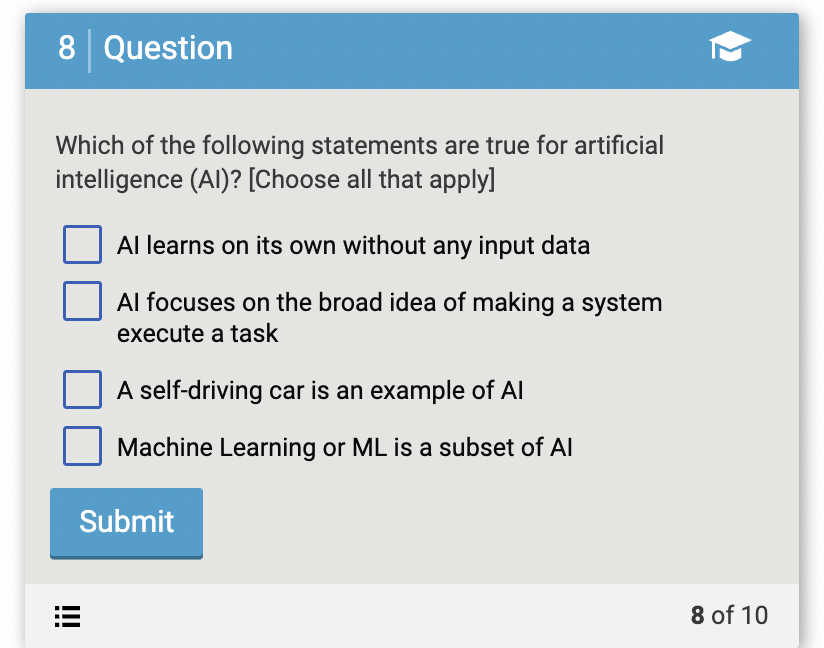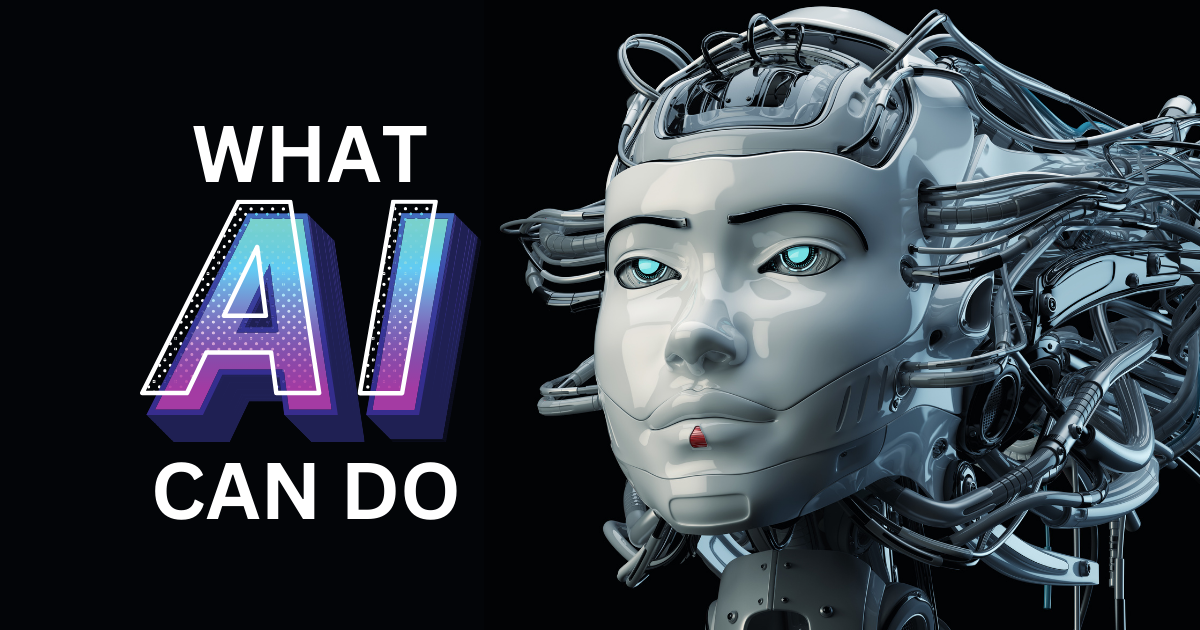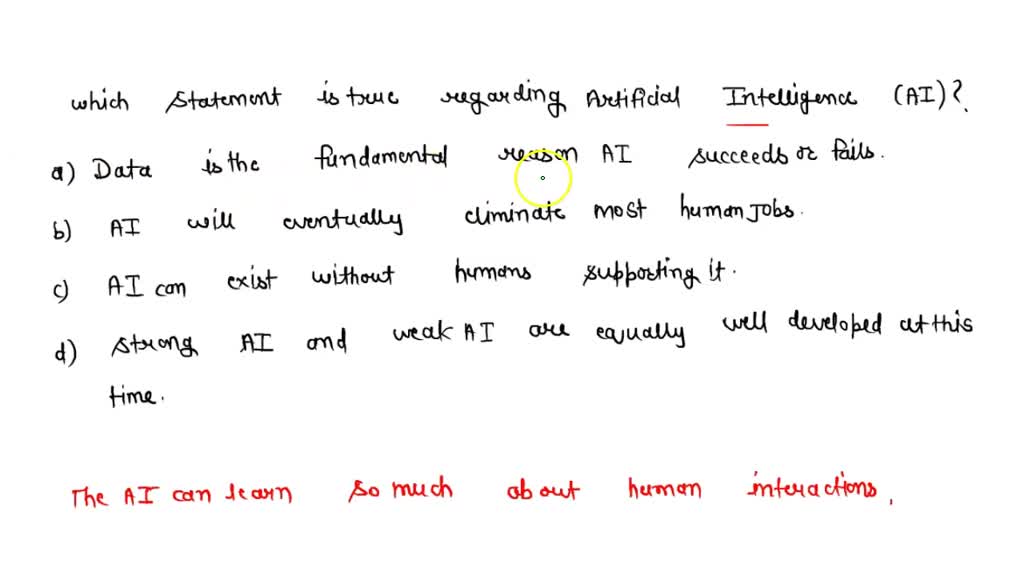Artificial Intelligence, commonly known as AI, is a big topic today. Many people talk about it. Yet, not everyone understands it completely. This article will help you learn about AI. We will explore which statements about AI are true. Let’s dive in!
What is Artificial Intelligence?
Before we find out the true statements, we need to know what AI is. AI is a branch of computer science. It focuses on creating machines that can think and learn like humans. These machines can perform tasks that usually require human intelligence. Examples include:
- Understanding speech
- Recognizing images
- Playing games
- Solving problems

Credit: www.chegg.com
Common Statements About AI
Many statements are made about AI. Some are true, while others are not. Let’s look at some common statements:
1. Ai Can Think Like Humans
This statement is partly true. AI can perform tasks like humans. However, AI does not have feelings or emotions. It can analyze data and make decisions. But it does not “think” like a human. AI processes information in a different way.
2. Ai Will Take All Our Jobs
This statement is often heard but is not entirely true. AI can automate some tasks. This means machines can do work faster. However, AI also creates new jobs. People will need to manage and work with AI. So, while some jobs may disappear, new ones will appear.
3. Ai Is Always Accurate
This statement is misleading. AI can make mistakes. It depends on the data it learns from. If the data is wrong, the AI’s decisions can also be wrong. Therefore, human oversight is essential. We must check AI’s work to ensure it is accurate.
4. Ai Is A New Technology
Many think AI is new, but this is not true. The concept of AI has been around for decades. It started in the 1950s. Scientists have been working on AI for a long time. It has evolved over the years but is not entirely new.
5. Ai Can Improve Itself
This statement is true. Some AI systems can learn from their mistakes. This process is called machine learning. Over time, they can become better at their tasks. However, they still need human input to guide them.

Credit: techyzar.com
Understanding AI: Myths vs. Facts
It’s essential to understand myths and facts about AI. Here’s a table to help clarify:
| Myth | Fact |
|---|---|
| AI can feel emotions. | AI does not have feelings or emotions. |
| AI will control the world. | Humans control AI and its uses. |
| AI is smarter than humans. | AI can outperform humans in specific tasks. |
| All AI is the same. | There are different types of AI for various tasks. |
Applications of AI
AI is used in many areas of life. Here are some examples:
1. Healthcare
AI helps doctors diagnose diseases. It can analyze medical images quickly. This helps in early detection of illnesses.
2. Transportation
Self-driving cars use AI. They can navigate roads and avoid obstacles. This technology can make driving safer.
3. Entertainment
AI recommends movies and music. It learns what you like. Then, it suggests similar choices for you.
4. Education
AI can personalize learning. It helps students learn at their own pace. This makes education more effective.
Future of AI
The future of AI is bright. Many industries will continue to use AI. We will see more advanced AI systems. These systems will help solve complex problems.
Ethical Considerations
As AI grows, we must think about ethics. Here are some important questions:
- How do we ensure AI is safe?
- How do we prevent bias in AI?
- Who is responsible for AI’s decisions?
Frequently Asked Questions
What Is The Primary Function Of Ai?
AI primarily automates tasks, analyzes data, and enhances decision-making in various industries.
How Does Ai Impact Daily Life?
AI improves daily life through personalized recommendations, smart home devices, and virtual assistants, making tasks easier.
What Industries Benefit From Ai?
Industries like healthcare, finance, and transportation significantly benefit from AI through efficiency and predictive analytics.
Is Ai Safe For Society?
AI safety depends on regulations and ethical guidelines to prevent misuse and ensure responsible development.
Conclusion
In conclusion, understanding AI is essential. Many statements about AI are made every day. Some are true, while others are myths. By learning more about AI, we can make better decisions about its use. Remember, AI is a tool. It can help us, but it is not perfect. Always question what you hear about AI. Seek the truth!
Further Reading
If you want to learn more about AI, here are some resources:
- IBM: What is Artificial Intelligence?
- Oxford Learner’s Dictionaries: Artificial Intelligence
- edX: Learn Artificial Intelligence
Thank you for reading! We hope this article helped you understand AI better.

